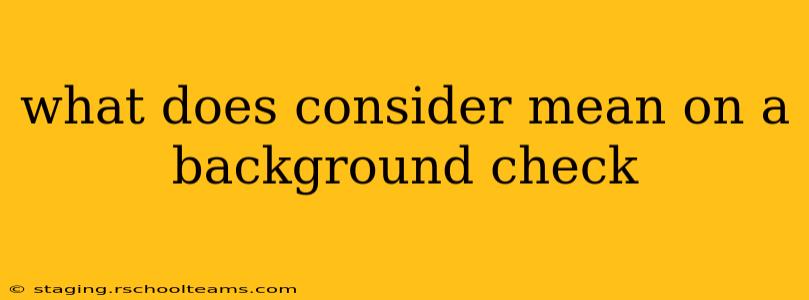The word "consider" on a background check report is a crucial term that often causes confusion. It doesn't mean a definitive yes or no regarding a specific event or issue; instead, it signifies that the background check company found information requiring further investigation or interpretation. This ambiguous term highlights the complexities and nuances within the background check process. Let's delve into what "consider" actually means and what you should do if you encounter it.
What Does "Consider" Indicate?
When a background check uses the term "consider," it means the information uncovered requires additional context or review. It doesn't automatically disqualify you, but it signals a potential red flag that needs clarification. The information flagged might be:
- Incomplete or Unverified: The information may be partially available but lacks sufficient verification to be definitively labeled as true or false. More research is needed to confirm its accuracy.
- Ambiguous: The details might be unclear or open to interpretation. For example, a record might mention an arrest but lack information on the outcome (conviction or dismissal).
- Potentially Relevant but Requires Context: The information might be relevant to the position you're applying for, but additional details are needed to determine its significance. For instance, a minor traffic violation might need additional context depending on the job's requirements.
- Requiring Professional Judgment: The information might need the judgment of a legal professional or specialist to assess its relevance to the background check. This is especially true for nuanced legal situations or medical conditions.
Important Note: The meaning of "consider" can vary slightly depending on the background check company and the specific report. Always refer to the report's accompanying documentation or contact the company directly for clarification.
What Should You Do If You See "Consider" on Your Background Check?
If you see "consider" on your report, don't panic. However, you should take proactive steps:
- Review the Entire Report Carefully: Understand the specific information flagged as "consider." Note the details and the context provided.
- Contact the Background Check Company: Ask for clarification on the specific points marked as "consider." They can provide further details about the information and the reasons for its ambiguous status.
- Gather Supporting Documentation: If you believe the information is incorrect or requires additional context, gather supporting documentation to clarify the situation. This might include court records, police reports, or letters of explanation.
- Prepare a Detailed Explanation: Create a concise and professional explanation addressing the points marked as "consider." This explanation should provide context and highlight any mitigating circumstances.
- Communicate with the Employer (If Applicable): If the background check is for a job application, be prepared to discuss the "consider" items with the potential employer. Be honest, transparent, and provide context.
How Can You Avoid "Consider" Flags in the Future?
While you can't always control what information appears on your background check, you can minimize the chances of ambiguous results by:
- Maintaining Accurate Personal Information: Keep your contact information and addresses up-to-date.
- Addressing Past Issues Proactively: If you have past legal issues or negative marks on your record, address them proactively. Demonstrate your rehabilitation and commitment to personal growth.
- Understanding Your Rights: Know your rights regarding background checks and access to your own information.
What are the differences between "consider," "disclosed," and "not disclosed"?
This is a great question clarifying the spectrum of information reporting. "Disclosed" means the information was found and verified. "Not disclosed" indicates the information was not found. "Consider" falls in the middle, suggesting that information was found, but its impact requires additional analysis or verification.
How long does a background check typically take?
The duration of a background check depends on various factors, including the depth of the check, the information requested, and the responsiveness of the sources. It can range from a few days to several weeks.
Can I dispute information on my background check?
Yes, you typically have the right to dispute any inaccuracies or incomplete information on your background check report. The process varies depending on the background check company and the specific regulations in your area. Be sure to follow the company's dispute resolution process outlined in their documentation.
In conclusion, "consider" on a background check indicates a need for further investigation. By understanding its meaning and taking proactive steps, you can effectively address any potential concerns and present yourself favorably. Remember, transparency and proactive communication are key to navigating this aspect of the background check process.
